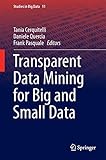Transparent Data Mining for Big and Small Data [electronic resource] / edited by Tania Cerquitelli, Daniele Quercia, Frank Pasquale.
Contributor(s): Cerquitelli, Tania [editor.] | Quercia, Daniele [editor.]
| Quercia, Daniele [editor.] | Pasquale, Frank [editor.]
| Pasquale, Frank [editor.] | SpringerLink (Online service)
| SpringerLink (Online service) .
.
Material type:  BookSeries: Studies in Big Data: 32Publisher: Cham : Springer International Publishing : Imprint: Springer, 2017Edition: 1st ed. 2017.Description: XV, 215 p. 23 illus. in color. online resource.Content type: text Media type: computer Carrier type: online resourceISBN: 9783319540245.Subject(s): Data mining
BookSeries: Studies in Big Data: 32Publisher: Cham : Springer International Publishing : Imprint: Springer, 2017Edition: 1st ed. 2017.Description: XV, 215 p. 23 illus. in color. online resource.Content type: text Media type: computer Carrier type: online resourceISBN: 9783319540245.Subject(s): Data miningPart I: Transparent Mining -- Chapter 1: The Tyranny of Data? The Bright and Dark Sides of Data-Driven Decision-Making for Social Good -- Chapter 2: Enabling Accountability of Algorithmic Media: Transparency as a Constructive and Critical Lens -- Chapter 3: The Princeton Web Transparency and Accountability Project -- Part II: Algorithmic solutions -- Chapter 4: Algorithmic Transparency via Quantitative Input Influence -- Chapter 5 -- Learning Interpretable Classification Rules with Boolean Compressed Sensing -- Chapter 6: Visualizations of Deep Neural Networks in Computer Vision: A Survey -- Part III: Regulatory solutions -- Chapter 7: Beyond the EULA: Improving Consent for Data Mining -- Chapter 8: Regulating Algorithms Regulation? First Ethico-legal Principles, Problems and Opportunities of Algorithms -- Chapter 9: Algorithm Watch: What Role Can a Watchdog Organization Play in Ensuring Algorithmic Accountability?
This book focuses on new and emerging data mining solutions that offer a greater level of transparency than existing solutions. Transparent data mining solutions with desirable properties (e.g. effective, fully automatic, scalable) are covered in the book. Experimental findings of transparent solutions are tailored to different domain experts, and experimental metrics for evaluating algorithmic transparency are presented. The book also discusses societal effects of black box vs. transparent approaches to data mining, as well as real-world use cases for these approaches. As algorithms increasingly support different aspects of modern life, a greater level of transparency is sorely needed, not least because discrimination and biases have to be avoided. With contributions from domain experts, this book provides an overview of an emerging area of data mining that has profound societal consequences, and provides the technical background to for readers to contribute to the field or to put existing approaches to practical use.


There are no comments for this item.